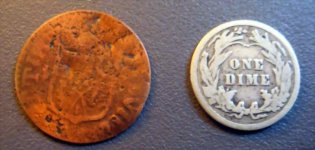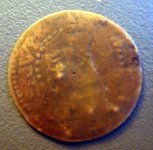doublet2a
Bronze Member
- Apr 15, 2007
- 1,281
- 306
- Detector(s) used
- Minelab Sov. Elite 5", 8" & 10" coils. EXP II 8" & 10" coils with inline Sunray pin pointer. AT Pro 8" & 10" Coils, Equinox 600 10" and 5" coils.
I'm posting this for a friend who asked me if I knew what it was 

I told him no,, but I know who will
YOU GUYS!!!!
Dime for size
Thanks
Tim


I told him no,, but I know who will

YOU GUYS!!!!

Dime for size
Thanks
Tim





 ,, Amazing brains here for sure
,, Amazing brains here for sure 